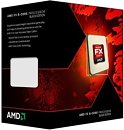Thursday, December 27th 2012

AMD FX-8300 Starts Selling, Lower TDP Comes at a Price
AMD started selling its FX-8300 eight-core processor, which has been in the news since early-November. The new chip comes with a relatively low TDP of 95W, compared to other eight-core FX "Vishera" processors, which ship with 125W TDP. Despite being slower than the other FX "Vishera" chips, the FX-8320 and FX-8350, its low-TDP appears to have given AMD a big enough selling point, to price the chip around $190. Based on the 32 nm "Vishera" micro-architecture, the AMD FX-8300 ships with a clock speed of 3.30 GHz, 3.60 GHz of TurboCore speed, eight cores spread across four modules, 2 MB L2 cache per module (8 MB total), and 8 MB shared L3 cache.
Source:
Expreview

97 Comments on AMD FX-8300 Starts Selling, Lower TDP Comes at a Price
This is on the same exact hardware with cores and ht being disabled and enabled in different ways. If I had a Vishera CPU, I would test with that too. Trust me, AMD has the better idea for multi-threading because at least the modules are more closely symmetric, unlike HT vs a real core.
Edit: Also don't misunderstand what I'm saying. Intel makes a very fast processor, AMD's core just scale better compared to Intel's CPUs with HT.
At least I produced data to prove my point, you're just blabbering useless non-sense.
Also, the only thing I see four of from that picture is the L3 caches in the center of the die.
You obvious don't know what you're talking about, so before you make a fool of yourself maybe you should actually find out what you're looking at.
I've marked the CORES in red (including L2 caches, which are technically shared I think but changes nothing), and the L3 cache in purple...
Edit: Yes, I know. I'm over-simplifying it, but you get the basic idea. The FPU is mixed somewhere in there, but my vision is only 20/20 and the resolution of the picture is kind of small. I can't see the 32nm wires to actually describe what is what, so you shouldn't claim that you can.
That's not a suggestion by the way. ;)
2: Intel uses a shared L3 cache as well.
3: AMD shared the L2 cache to save space. The benefits out-weight the costs because you won't see a performance loss on a single thread because nothing else is touching the cache.
4: You're being called a fool and troll because you don't know what you're talking about. Not that I condone it and you started by calling me a fan boy, so I wouldn't go opening that can of worms.
5: The main reason is because the IPC is low due to increased chance of branch mis-predictions due to the length of the pipeline as well as how many instructions each "core" (NOT MODULE) can execute per cycle (which Vishera improved to some extent with the improved branch predictor and added x86 decoders.)
Yeah, AMD hasn't gotten it perfect for single-threaded applications, but it's a multi-threaded beast and as soon as AMD improves the IPC a bit more, it will be a lot more powerful than it already is not even considering the benefits to be had once they start producing it on a smaller process.
Also, if you knew anything about how memory heirarchies work, you would know that shared L2 cache would be the bottleneck when both cores in a module are running full power, not on single-threaded applications. So maybe you need to do a bit more research before you start claiming things that have no relevance considering AMD's multi-core performance is pretty good, despite executing fewer IPC.
So all in all, I don't agree with the labeling and I'm guilty of doing it from time to time (I'm trying not to, I really am. :p) but there is a reason why people get frustrated and start resorting to such tactics.
All in all, your comments have no factual backing and you're making a boatload of false assumptions... and you know what they say about making assumptions. :)Or we need to wait for AMD to continue improve how many instructions per clock so all 8 cores run fast. I also don't find many people with Vishera chips complaining about them which usually is a sign that they're not that bad.Now now, you don't need to call Prima.Vera a fool, only the pitty is required. :)
AMD's additional cores isn't a technique, it's cores exist in the physical, thus produce heat.
So you want 4 physical cores to produce the same heat as a technique which doesnt exist in the physical?
AMD however has added shared resources in order to run two almost symmetric cores in tandem while saving die space.
Neither are bad, they're just different technologies with different goals in mind. HT adds efficiency to multi-threading sacrificing multi-threaded performance where AMD has something that scales better. Even more so when you improve how many instructions you can execute, because even small gains on an 8-core will scale almost equally across all 8 cores, unlike HT.
Keep in mind, though, I can't emphasize this enough. Neither technology is bad.
OT- very interested in a 95w FX-8 Vishera but the price needs some work..... :shadedshu
I guess I should have said it virtually doesn't produce additional heat, because the additional heat produced is negligible compared to having more cores, to the point where I didn't think it had to be mentioned.
All they need to do now is get the 22nm transition right and improve the IPC and they'll have a winner on their hands. Let's see if Steamroller can pull it off.
IF AMD is charging more, it's a better chip. I'll believe that, no problem. There is ZERO reason for a higher price, except that the silicon is better. 8350 is 4.0 GHz, 4.2 GHz Turbo.